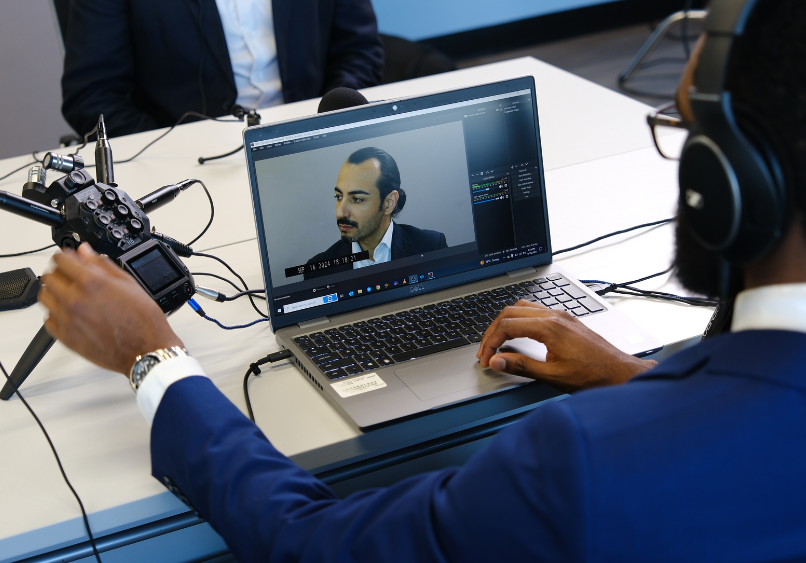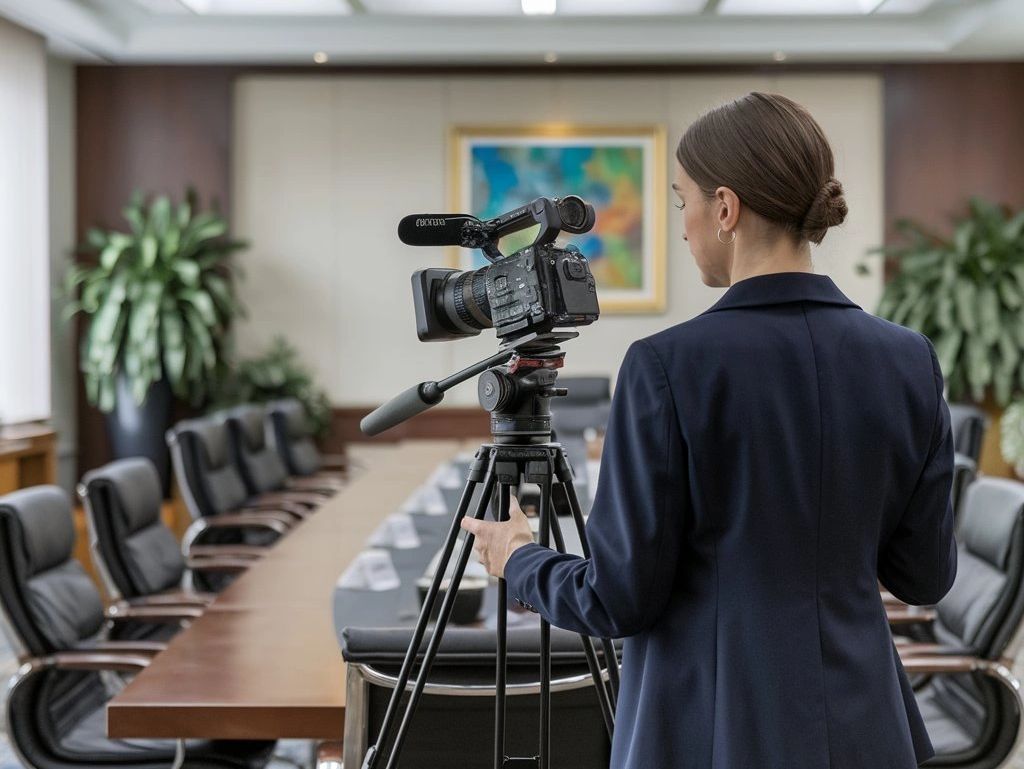Legal video depositions FAQs: Answering your most pressing questions
Wiki Article
The Significance of Legal Video Clip Depositions in Modern Legal Providers: What You Ought to Know
Lawful video clip depositions have become vital in today's legal landscape. They give a multidimensional view of witness statements that typical records simply can not match. By recording both verbal and non-verbal interaction, these depositions enhance the overall understanding of a witness's trustworthiness. The efficiency of video clip depositions hinges on numerous variables, including compliance with legal requirements and ideal techniques. Exploring these components discloses their true importance in modern-day lawful solutionsWhat Are Lawful Video Clip Depositions?
Legal video clip depositions function as a vital tool in the lawsuits process. They involve recording witness testimonies in a video style, recording both non-verbal and verbal communication. This approach allows attorneys to document the disposition, expressions, and responses of witnesses, supplying a richer context for the statement. Generally conducted in a controlled setting, these depositions are led by attorneys that ask inquiries while a court reporter documents the discussion. The resulting video can be crucial for trial preparation, as it allows lawyers to evaluate the reputation of witnesses and fine-tune their strategies. Furthermore, legal video depositions can be made use of in numerous lawful contexts, ranging from civil disputes to criminal cases. The acoustic and visual components of video depositions boost the presentation of proof, making it a necessary element in the modern legal landscape. Generally, they contribute substantially to the efficiency and performance of legal procedures.
Advantages of Video Clip Depositions Over Conventional Approaches
Video depositions supply various benefits contrasted to conventional methods of taking witness statements. One substantial benefit is the capability to catch both aesthetic and audio elements, providing a much more extensive record of the witness's statements. This twin format improves clearness and enables legal experts to reference specific nuances during trial preparation. Additionally, video clip depositions facilitate remote engagement, making it less complicated for witnesses who may be not available for in-person appearances because of geographical restraints or health issues.Moreover, video depositions can expedite the total deposition procedure, decreasing the time and costs related to traveling and logistics. They also improve accessibility, as taped depositions can be conveniently shared amongst lawful teams and referenced at any moment. This benefit contributes to much better case administration and prep work. On the whole, video depositions represent a modern-day, reliable technique to gathering witness testaments, lining up with the progressing demands of the legal profession.The Role of Body Language and Tone in Testimonies

In legal video clip depositions, body movement and tone play essential duties in conveying a witness's credibility and reliability. Nonverbal cues can provide insights right into a witness's emotion, influencing how their statement is perceived. Recognizing the impact of these aspects is important for attorneys and jurors alike when examining the dependability of a testament.
Nonverbal Interaction Insights
While spoken interaction is typically stressed in legal statements, nonverbal cues such as body language and tone play a necessary duty in communicating trustworthiness and feeling. Viewers of depositions might keep in mind that a witness's pose, gestures, and facial expressions can substantially affect perceptions of reliability. For example, constant eye get in touch with might signal confidence, while preventing gaze could suggest dishonesty or pain. The tone of voice-- its speed, quantity, and pitch-- can present feelings of genuineness or uncertainty. Lawful specialists need to be in harmony with these nonverbal signals, as they typically offer vital context that complements talked words. Understanding these nuances can enhance the performance of depositions and influence the result of legal proceedings.Emotional Tone Influence
The emotional tone communicated throughout lawful statements substantially influences just how a witness is viewed. Body movement, singing inflections, and facial expressions play important roles fit the narrative of a testimony. A witness displaying self-confidence with stable eye get in touch with and a tranquil tone can instill a feeling of reliability and involvement. On the other hand, signs of stress and anxiety, such as fidgeting or a shaky voice, may result in suspicion regarding their account. The nuances of emotional expression can influence the interpretation of realities, making it important for legal professionals to recognize these cues. In video depositions, the auditory and visual elements integrate, highlighting the significance of emotional tone in conveying genuineness and truthfulness within the legal process.Integrity and Credibility
An important consider establishing trustworthiness and reliability during testimonies depends on the witness's body language and tone of voice. Onlookers frequently count on non-verbal hints-- such as eye contact, stance, and gestures-- to analyze a witness's genuineness. A witness who maintains eye call and displays open body language might be regarded as even more sincere and trustworthy than one that prevents eye call or appears closed off. Furthermore, great post to read intonation plays a necessary function; a stable, calm tone can reinforce the credibility of the testament, while variations in pitch or quantity might raise uncertainties. Inevitably, the combination of body language and singing tone considerably influences how a witness's statements are obtained and translated in a legal context.Ideal Practices for Carrying Out Video Depositions
Performing video clip depositions needs mindful preparation and execution to assure a effective and clear discussion of statement. Initially, it is crucial to choose a silent, well-lit place to minimize disturbances and protected optimal video clip quality. The tools must be tested in development, including cams, microphones, and lighting, to prevent technological problems throughout the deposition.Next, events involved should evaluate the format and procedures in advance, ensuring that every person recognizes their functions. The deponent must be oriented on the procedure, including how to respond clearly and concisely.Additionally, maintaining a professional behavior throughout the session is important. This includes avoiding from talking over each other and verifying that all concerns are directed appropriately. It is important to record the deposition in a format that allows for simple playback and evaluation, protecting the honesty of the testament for future usage.Lawful Factors To Consider and Conformity Issues
Just how do lawful factors to official website consider and compliance issues impact the effectiveness of video depositions? Lawyers must navigate a complex landscape of laws, guaranteeing that video depositions follow jurisdictional rules and standards. Conformity with regulations worrying personal privacy, permission, and tape-recording techniques is necessary. As an example, acquiring explicit consent from all parties involved is required to prevent legal repercussions.Additionally, the admissibility of video evidence in court can depend upon compliance with procedural requirements. Ensuring that the tools utilized satisfies technical requirements is also important, as low quality can undermine the deposition's reliability.Moreover, lawyers need to be aware of any kind of certain state laws that control video depositions, as these can differ considerably. Failure to resolve these considerations can not just endanger the honesty of the deposition however also affect the overall situation strategy, inevitably affecting the customer's legal end results.How Video Clip Depositions Impact Court Perception
While video depositions can act as powerful devices in legal procedures, their impact on jury assumption is significant. The aesthetic and acoustic elements of video clip recordings supply jurors with a more complete understanding of witness disposition, integrity, and emotional feedbacks. This multimedia method can enhance the jurors' ability to assess the integrity of testimony compared to traditional text-based transcripts.Moreover, video depositions permit jurors to observe body language, tone of voice, and face expressions, every one of which can influence their interpretation of the witness's statements. The visibility of a witness on screen can humanize them, cultivating empathy and connection, which may guide jurors' viewpoints. Alternatively, a witness that appears unreliable or incredibly elusive on video may result in unfavorable perceptions that affect a court's decision. Eventually, the vibrant nature of video clip depositions plays an important function in forming how jurors translate proof and reach their decisions.The Future of Video Clip Depositions in Legal Technique
As innovations in technology continue to improve the lawful landscape, the future of video clip depositions is poised for significant development. Innovations such as expert system, online truth, and improved video conferencing tools are anticipated to simplify the deposition procedure and boost accessibility. Attorneys might make use of AI-driven analytics to assess witness credibility and situation toughness a lot more effectively.Moreover, the combination of virtual reality could permit courts to experience immersive simulations of depositions, offering much deeper context and understanding. Furthermore, the fad toward remote depositions is likely to continue, using higher versatility for lawyers and customers alike.As remote job ends up being increasingly normalized, video depositions will likely become basic practice, reducing prices and time restrictions connected with traditional methods. Generally, these technical advancements promise to boost the performance, efficiency, and availability of published here video depositions in lawful practice, inevitably transforming just how attorneys plan for trial.Regularly Asked Concerns
Just How Much Do Lawful Video Clip Depositions Normally Cost?

Can Video Depositions Be Made Use Of in Any Type of Instance?
Video depositions can be utilized in numerous kinds of instances, including civil, criminal, and household regulation. Their versatility allows lawyers to existing witness testimonies properly, adapting to the particular demands of various lawful scenarios.What Equipment Is Required for a Video Deposition?
To carry out a video deposition, important tools includes a high-quality video camera, microphone, illumination, and a dependable recording tool. Additionally, a computer system with editing software might be needed for post-production and formatting the final video clip.The length of time Does a Normal Video Clip Deposition Last?
A common video clip deposition lasts in between two to four hours, depending on the intricacy of the case and the number of concerns posed. Extensive sessions may occur, however breaks are generally incorporated for participant convenience.

Are Video Depositions Admissible in Court?
Video depositions are usually permissible in court, given they stick to legal criteria and rules of evidence. Their usage boosts quality and maintains witness statement, helping in the judicial process during trials and hearings. Lawful video clip depositions have actually come to be necessary in today's lawful landscape. Furthermore, legal video clip depositions can be made use of in different legal contexts, ranging from civil disagreements to criminal instances. Furthermore, video depositions help with remote participation, making it less complicated for witnesses that may be unavailable for in-person looks due to geographical restrictions or health and wellness issues.Moreover, video depositions can quicken the general deposition process, reducing the time and prices linked with traveling and logistics. Ensuring that the equipment utilized satisfies technical requirements is likewise vital, as bad quality can threaten the deposition's reliability.Moreover, attorneys have to be mindful of any kind of details state regulations that control video clip depositions, as these can differ considerably. Furthermore, the pattern toward remote depositions is most likely to persist, supplying higher adaptability for attorneys and customers alike.As remote work comes to be progressively normalized, video depositions will likely become standard method, reducing expenses and time restraints connected with typical methods.Report this wiki page